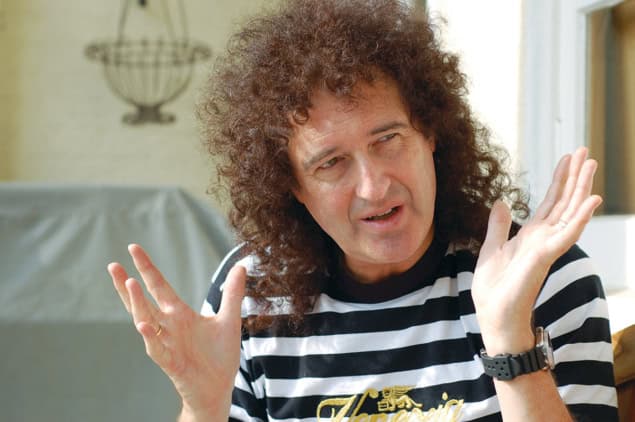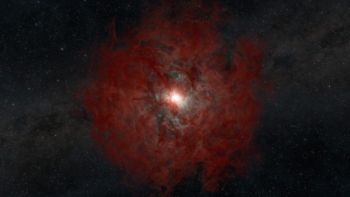Queen guitarist Brian May has written a book on the history of the universe. Edwin Cartlidge spoke to the rock legend and Imperial College physics graduate to find out why and how he moved into popular-science writing

Sitting on the terrace of Brian May’s Surrey mansion on a sunny late summer’s day, at times it is easy to forget how May made his name. Aside from his trademark long, curly locks, there is little to suggest that this is the guitarist in one of the world’s most famous and flamboyant rock groups – Queen – and the writer of hits such as “We will rock you” and “Fat bottomed girls”. Chatting to Physics World in a quiet, unassuming way, he talks about a wide range of topics, from his fascination with Victorian stereo photography and his fondness for archiving, to speculation about the origins of life on Earth. He also discusses another life-long passion, and the reason for the visit from this magazine: astronomy.
Together with veteran astronomy popularizer Sir Patrick Moore, and Chris Lintott – Moore’s sidekick on the television programme The Sky at Night – May has written Bang! The Complete History of the Universe, published by Canopus Books and due out later this month. This modestly titled book is designed to be a layperson’s guide to cosmology – a chronological account of the development of the universe from its extremely brief but ultrarapid “inflationary” expansion, through the development of stars, planets and life, and finishing with its likely fate – a cold, featureless death.
I wanted it to be a book that people would read and feel in some sense that they understand the whole story of creation.
Brian May
Having spent most of his life strutting around on stage in front of adoring fans, May, 59, seems an unlikely person to have written such a book. But in fact he graduated in physics and went on to do most of a PhD in astronomy, and has retained an interest in science ever since. Indeed, he has been keen to ensure that the book is genuinely informative, and that it is not some glossy cop-out. “I wanted it to be a book that people would read and feel in some sense that they understand the whole story of creation,” he says. “I did not want it to be something that you just buy and stick on your coffee table.”
Don’t stop me now
It was Moore who sparked the young May’s interest in astronomy. From the age of about seven, May used to beg his parents to be allowed to stay up and watch The Sky at Night. For him, the subject matter seemed mysterious and exciting, and he hung on to every word that Moore uttered. “I remember trying to put stars on my ceiling and fitting my cupboards out so that it felt like you were in space when you put your head in them,” he recalls.
May’s scientific bent took him to Imperial College in London, where he graduated in physics. He stayed at Imperial to do a PhD on the motion of interplanetary dust particles, and got as far as writing up his thesis and drawing the accompanying figures. But it was then that his other great passion – music – caught up with him. Having started rehearsing with Roger Taylor and Freddie Mercury in a group that was to become Queen, May realized it was now or never for his music. So he ditched his PhD and went off to become a rock star. “It was probably good for the scientific community that I did this,” he adds modestly. “I was known in the department for being a bit erratic. I tended to work during the night rather than the day, which meant I missed lots of meetings.”
In person: Brian May
Born: London, 1947
Education: Imperial College, London (degree in physics and unfinished PhD in astronomy)
Career: guitarist and songwriter in Queen, and a solo artist
Outside interests: astronomy, photography, archiving
Family: married to actor Anita Dobson, has three children from his first marriage
For years May never really imagined that he could make a career out of his music, but ironically it is the security that he has acquired from being an extremely successful rock star that has, years later, allowed him to return to astronomy. He spends many an hour staring up at the skies through his portable telescope, and more occasionally uses the 10 inch telescope located inside the miniature observatory he has built on his considerable back lawn. He even hopes to finish his PhD, using data from a telescope on Tenerife that his astronomer friend Garik Israelian, based at the Canaries Institute of Astrophysics, will help him obtain.
May’s involvement in Bang! Followed a trip to Scotland with Moore to view an annular eclipse in May 2003. While in Scotland, Moore suggested they get together to write a book on cosmology. Although May at first thought he would have little to contribute to the project, Moore persisted and eventually managed to win him round. A few months later the two discussed the nuts and bolts of the book at Moore’s Sussex house. Lintott, who is doing a PhD in astronomy at University College London, also happened to be at the house at the time, and the three realized that together they could make a powerful team – Moore with his panoramic view of astronomy, Lintott with the up-to-date knowledge of cosmology research and May, as it turned out, the one best suited to ensuring the book remained clear and understandable to the non-expert. Plus there was the prospect that May’s name was likely to do no harm to the sales figures.
Once the meeting was over, Moore sat down at his old typewriter and within a week had bashed out the first draft. Then followed two years of rewriting, and plenty of heated disputes over single words and sentences. For May, it was vital that the book retained the linear narrative they had consciously opted for in preference to the now more conventional approach of packing in plenty of human anecdotes. “Brian kept us focused on the task in hand,” recalls Lintott. “He was also extremely rigorous in finding the right analogies – at times the process felt to me rather like a three-year-long viva with a particularly tenacious examiner,” he says of May.
I want it all
One of the issues that the three co-authors profoundly disagreed about was the issue of whether life exists elsewhere in the universe. May believes that the life found on Earth could exist elsewhere, its seeds having been carried throughout the universe on the back of meteorites, as proposed by the late astronomer Fred Hoyle (a “fantastically original thinker” according to May). But, unlike Moore, he does not think that life could have started independently in many different parts of the universe. “The idea is that given a particular paint box a Picasso will emerge. I don’t believe it,” he says.
To be honest, I would probably kill someone if I saw them torturing a cat.
Brian May
May has strong views on a wide range of other subjects, to which a continually updated stream of comments on his website testify – be they the evils of capitalism, the folly of the Iraq war or gripes with his new laptop computer. He also believes that scientists must take greater notice of their ethical responsibilities. For example, he is deeply opposed to drug testing on animals and also questions the right of scientists to smash objects into comets. “My objections to this kind of project are slightly tongue in cheek,” he says. “But to be honest, I would probably kill someone if I saw them torturing a cat.”

An obvious question that springs to mind when talking to May is how he manages to fit in all he does. In addition to his music, his astronomy, spending time with his family and updating his online soap box, he also acts as producer and musical director to the Queen musical We Will Rock You (currently on stage in London and cities overseas), writes the odd score for other theatrical productions, and campaigns for Aids sufferers. “I try to get a a balance in my life,” he says. “It’s still very hard because I do so much, but I like it that way. I’ve learned a lot about dividing time and allowing yourself to be helped by other people.”
Daniel Radcliffe: VFX tricks and wizardry
One activity that he devotes significant time to is photography, and in particular studying and archiving the work of Victorian 3D photographer T R Williams. For May, Williams is a hero. “He was an amazing technician and a perfectionist, but at the same time a complete artist,” he says. “And he was also commercially successful.”
This ability to combine fulfilment with commercial success is one that fascinates May (who admits that he too suffers from the “perfectionist disease”). “If you have just one of those, life can be a bit bleak,” he says. “You can do great art that no-one ever sees, you can do great science but there is nothing to apply it to, or else you can be commercial and crass and have nothing to say.”
The “little dividing line” that links these elements is, says May, where he tries to put himself. Having made his millions by writing and playing songs in Queen, he has arguably proved himself in the world of the arts. He now hopes he can find some success with his foray into the world of science.




